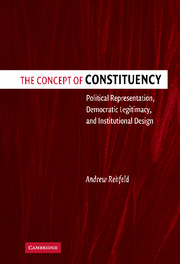 The Concept of Constituency
The Concept of Constituency Book contents
- Frontmatter
- Contents
- List of Tables
- Preface
- PART I CONCEPTUAL FOUNDATIONS: ON CONSTITUENCY AND POLITICAL REPRESENTATION
- 1 Introduction
- 2 The Concept of Constituency
- PART II HISTORICAL JUSTIFICATIONS: ON THE ORIGINS OF TERRITORIAL CONSTITUENCIES IN THE UNITED STATES
- PART III NORMATIVE APPLICATIONS: ON LEGITIMATE REPRESENTATION AND INSTITUTIONAL DESIGN
- Index
1 - Introduction
Published online by Cambridge University Press: 27 July 2009
- Frontmatter
- Contents
- List of Tables
- Preface
- PART I CONCEPTUAL FOUNDATIONS: ON CONSTITUENCY AND POLITICAL REPRESENTATION
- 1 Introduction
- 2 The Concept of Constituency
- PART II HISTORICAL JUSTIFICATIONS: ON THE ORIGINS OF TERRITORIAL CONSTITUENCIES IN THE UNITED STATES
- PART III NORMATIVE APPLICATIONS: ON LEGITIMATE REPRESENTATION AND INSTITUTIONAL DESIGN
- Index
Summary
[P]olitical philosophy may try to calm our frustration and rage against our society and its history by showing us the way in which its institutions, when properly understood from a philosophical point of view, are rational and developed over time as they did to attain their present, rational form.
– John RawlsMan is very much a creature of habit. A thing that rarely strikes his senses will generally have but little influence upon his mind.
– Alexander HamiltonAll politics is local.
– Tip O'NeillGENERAL INTRODUCTION
In almost every democracy in the world, citizens are represented by where they live. In Canada, India, and France, political representatives are elected by groups of voters who live in the same place, whether that location is a province, state, district, or municipality. In Germany, India, and Russia, too, territorial representation is a central feature of legislative design. And every ten years in the United States, congressional districts are redrawn, physically constituting political representation in the House of Representatives by where its citizens live. Why do democratic governments define political representation by where people live? Are territorial electoral districts commensurate with basic principles of democratic legitimacy? And why might our commitments to these principles lead us to endorse a radical alternative to territorial or group representation: randomly assigning citizens to single-member, national electoral constituencies in which they remain for life? These are the basic questions of this book.
- Type
- Chapter
- Information
- The Concept of ConstituencyPolitical Representation, Democratic Legitimacy, and Institutional Design, pp. 3 - 28Publisher: Cambridge University PressPrint publication year: 2005
